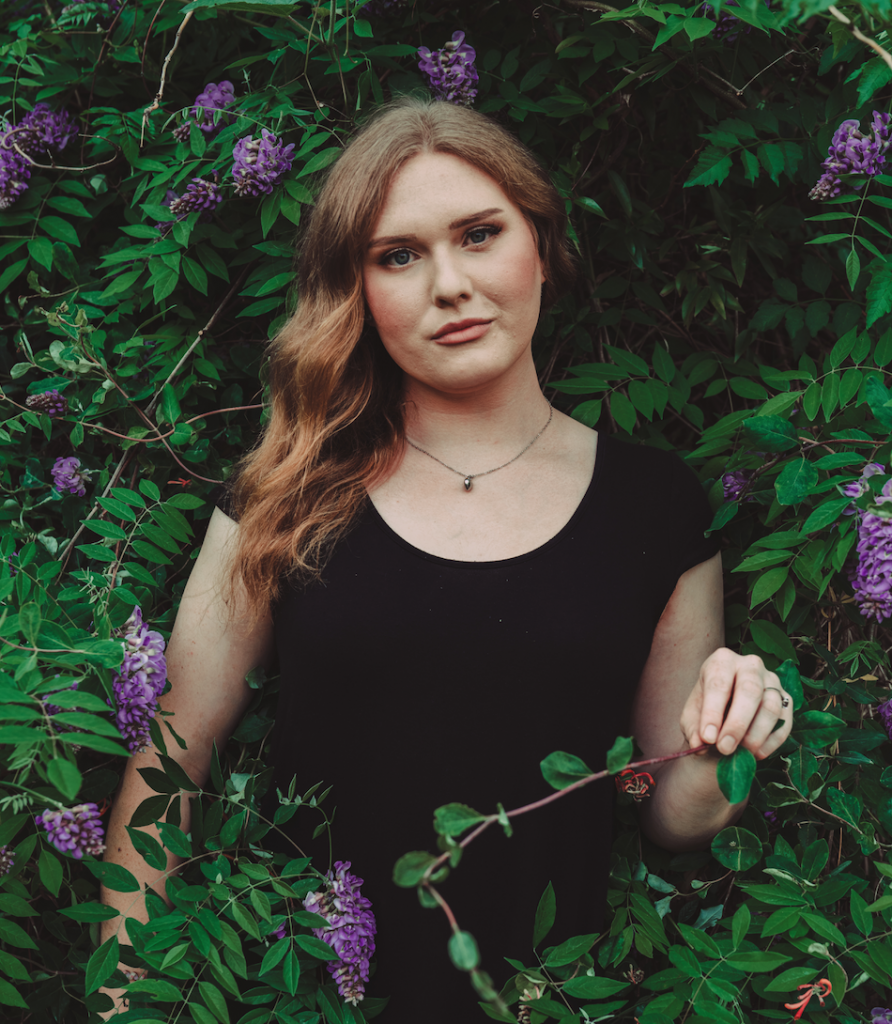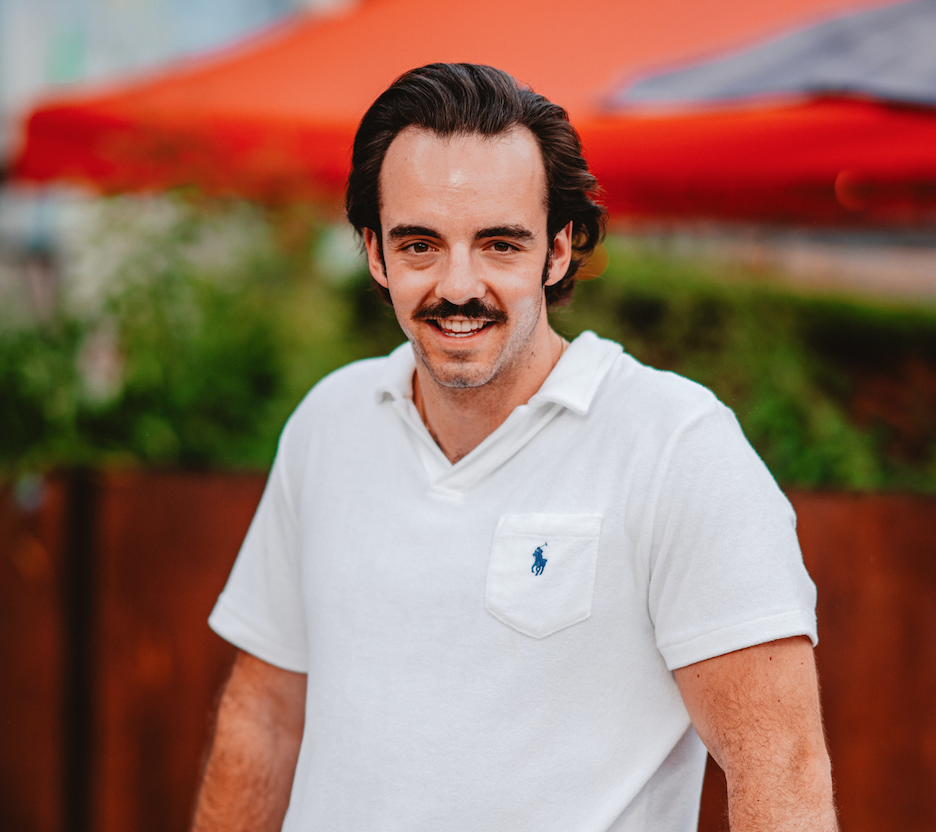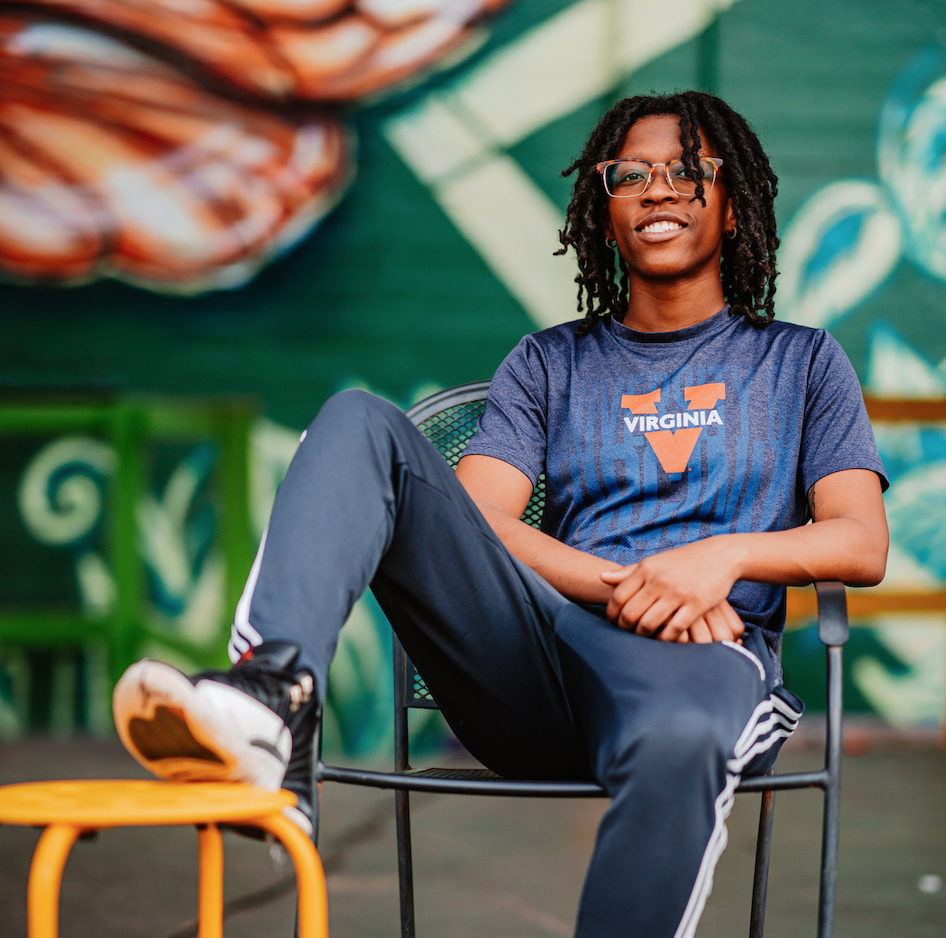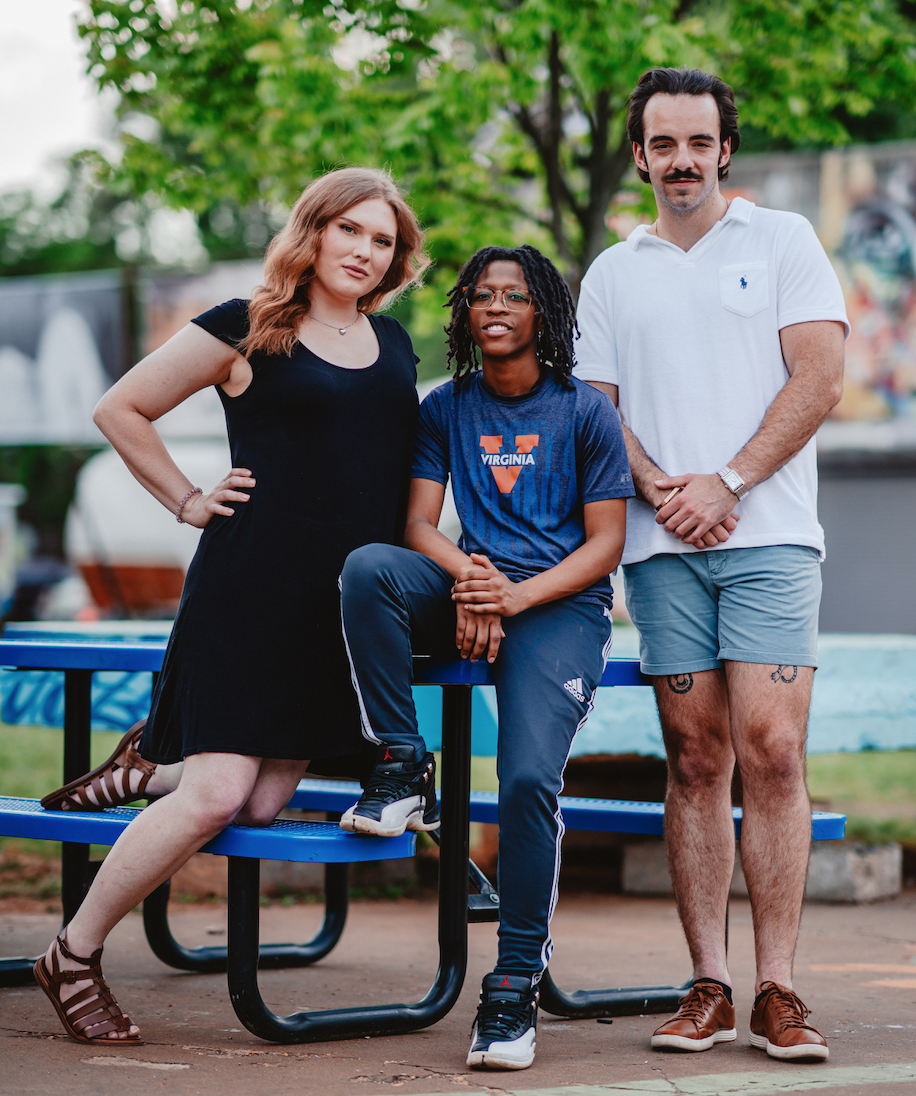Sitting on the floor of his bedroom, Carter cracked like an egg.
It was December 1, 2020, the doldrums of a Covid year; technically Carter was in a Zoom class, but attending his sophomore year of Charlottesville High School from home had long lost its novelty, so Carter was scrolling through Instagram when a simple square of black text on a white background caused him to pause.
It was a post by the actor and producer Elliot Page. “Hi friends, I want to share with you that I am trans, my pronouns are he/they and my name is Elliot,” Page wrote. “I feel lucky to be writing this. To be here. To have arrived at this place in my life.”
“I felt an immediate panic,” said Carter in a March 2024 interview. “Something in me was just like, that’s what I need to do.”
In the parlance of some trans communities, an ‘egg’ is a person who is trans, but hasn’t realized it yet. The egg ‘cracks’ at the moment of self-insight—the gender epiphany. For Carter, that moment occurred as he read Page’s words.
Three and a half years later, Carter is 19, a second year at UVA, and a trans man. His real name isn’t Carter; he asked to be identified by a pseudonym because many people don’t realize he’s trans, and he appreciates being able to choose whether or not he shares that part of himself with others.
Carter has a quiet but intense energy. His initial email offering to participate in this article was concise; still, it was clear that its emotional current cut deep.
“I would be excited and honored to be considered for an interview,” Carter wrote.
Each recent generation of U.S. adults has had about twice as many lesbian, gay, bisexual, transgender, or Queer members as the preceding generation, according to Gallup surveys. A 2021 CDC survey of U.S. high school students found that one in four identified as gay, lesbian, or bisexual—and the CDC didn’t ask students about gender identity, so the actual number of LGBTQ+ students is likely even higher.
Queer kids (this article, in keeping with many young LGBTQ+ people, uses LGBTQ+ and capital-Q Queer interchangeably) are also feeling more accepted in the school environment than they have in the past. The 2021 GLSEN School Climate Survey found that the rates of harassment experienced by Queer students based on sexual orientation, gender expression, or gender are the lowest they’ve been in the 20 years the survey has been given.
Yet at the same time, there’s a paradox: Teens are Queerer than ever, but they are also sadder than ever—and Queer teens are especially sad. The 2021 CDC survey also found that 75 percent of LGBT high-school students feel persistently sad and hopeless, a 15 percent increase since 2015, and 20 percent higher than the overall teenage population.

When she was in eighth grade, Sydney Walther decided to come out as a girl. It was 2011, and Walther, who at the time attended Albemarle County Schools, started by telling her close friends, who were overjoyed for her. Her parents were also supportive, though worried about her becoming a target for bullying.
Unfortunately, Walther’s parents’ worries proved founded: When Walther entered ninth grade at Albemarle High School in 2012, she was bullied relentlessly. Her classmates did not use her new name and desired pronouns, and to make matters worse, the administration at AHS refused to allow Walther to use the girls’ bathrooms.
So in 2013, Walther transferred to Charlottesville High School. (This writer was also a student at CHS in 2013, but knew Sydney only in passing.)
“For the time, CHS was fairly accepting and progressive,” said Walther. She was allowed to use the girls’ bathrooms, and her new classmates were generally accepting.
“At least to my face, most people used my correct pronouns and name. There were a few times that I was misgendered or dead-named on purpose, but only a couple of instances,” said Walther.
Walther made new friends at CHS. Meanwhile, encouraged by her parents, she began the medical gender transition process. By the time she was 16, Walther was taking testosterone blockers and estrogen.
But “whether I was at Albemarle or Charlottesville, I was on my own,” said Walther. “I felt like the only openly trans person that had at least started their transition. I didn’t really feel like I had anyone that I could relate to.”
For the most part, Walther said she encountered fewer incidents of harassment at CHS than at Albemarle High school, but the ones that did occur were particularly disturbing. Walther recalled that there was a period of a few weeks when, while walking to her car at the end of the day, another student would shout threats of violence at her in the parking lot.
“I remember being legitimately scared. My mind was in so many other places that it was hard for me to keep up with my schoolwork,” Walther said.
“What used to happen is people would come out to themselves in high school but not tell anyone, tell their friends when they were in their 20s, and only by the end of their 20s tell their parents,” said Dr. Charlotte Patterson, a professor at UVA who studies the psychology of sexual orientation and has worked with LGBTQ+ families and teenagers for decades.
“Today, the average age of recognizing yourself is around 14, telling friends around 16, telling family and parents by 17. Lots of kids are talking about LGBTQ+ issues with their friends when they’re in high school now, which never used to happen,” Patterson said, adding that this shift to coming out younger makes the school environment all the more important for Queer youth.

In 2008, while an 8th grader at Tandem Friends School, Logan Hall told a friend he was gay. That friend then told the rest of their classmates.
“I wasn’t that mad about it,” said Hall. “I wanted to be out, but didn’t want to go through the process of telling everyone individually. It was not ideal for him to break my trust, but in the moment, and even in retrospect, it didn’t feel dramatic to me.”
Hall went to CHS for high school and graduated in 2013, and he now looks back on the antics of his adolescent self with amusement, but also respect.
“At the time, I just felt like I really had to put on a display as an act of resistance. Like no matter how homophobic people are, my clothes are going to be as tight as I want, and I’m going to wear makeup if I want to. I feel like I just got a huge dose of self-possession in eighth grade. I was kind of a passive kid, I was bullied a little bit when I was younger, I was quiet and sensitive … Maybe it was fury, but I just suddenly was like, ‘I’m going to be who I want to be and I’m going to get what I want out of life,’” said Hall.
“I think I was just blindly confident,” said Tamara Starchia, who came out as a stud (a masculine Black lesbian) before high school and graduated from CHS in 2014.
“Everyone already thought I was gay,” said Starchia. “So by the time we got to high school, it was like, whatever. I was always sporty. It just kind of made sense.”
Starchia said that she doesn’t remember there being a particularly active Queer community presence at CHS, and even if there had been, she feels that it’s unlikely that she’d have been able to attend any community meetings: Between school, sports, and working at Raising Cane’s, her schedule was booked.
Fortunately, Starchia said she didn’t encounter much bullying at CHS. When she did need support, she went to her guidance counselor, another Black woman, or her basketball coach. Other than her guidance counselor, Starchia doesn’t recall ever taking an issue to the CHS administration, saying, “I kept a pretty low profile.”
And though her family was not immediately supportive of her Queer identity, Starchia credits the trajectory of her coming-out experience to the values instilled in her growing-up.
“I think my experience was as positive as it was because I grew up being told to not care about what people think about me,” said Starchia. “Your family loves you, and you love you. What other people think doesn’t matter.”
“The thing I’m noticing, especially in the last two or three years, is that kids are really flexible with the changes their peers are making with regards to their identities because they’re probably doing a little changing themselves,” said Will Cooke, who’s been the director of the CHS choirs for the past 16 years.
Jason Bennett, an assistant principal at CHS, said, “I think students and, you know, youth and people as a whole are seeing themselves more in the world that they’re living in, and I think that inevitably opens up to people living as their true selves.”
“When I think back even—Lord have mercy—20 years ago when I was in high school, it was a completely different world than probably when you were here in high school, right?” Bennett added.
Sisters Cora and River are almost exactly 10 years apart in age: Cora, the second of four kids, is 28, and River, the youngest, is 18. Cora graduated from CHS in 2014–River, in 2024. Both of the sisters’ names have been changed at their request. Both sisters are thoughtful, reserved in crowds, and more comfortable joking with small groups of friends in large gatherings.
Both are Queer: Cora came out as bisexual during her final year of college; River has been out as Queer since her freshman year of high school and has recently come to identify as a lesbian.
River is grateful to have had the space while still a teenager to contemplate her identity.
“I’ve had the privilege to be self-reflective,” she said, naming the support of Queer family members, friends, and teachers as crucial to allowing her to come to terms with her Queer identity in her own time.
But for Cora, despite growing up in the same family and going to the same high school, coming out in high school just didn’t feel like an option that was available to her.
“There’s a grief for that missing experience, of not experiencing coming of age while having a full sense of my identity,” said Cora, adding that she’s happy that River and her friends get to “explore and learn so much at a younger age.”
“Whereas for me and my friends, we were just not aware,” Cora added.
Every year, more Queer kids find self-acceptance, which seems to make it easier for other Queer kids to “catch” self-acceptance from their peers. Often, a Queer high schooler no longer has to be willing to be the only Queer kid they know in order to come out. They can simply be a regular kid who happens to be Queer.
Despite this, or perhaps because of it, according to the Trans Legislation Tracker, every year since 2015 has seen more attacks on the rights and identities of LGBTQ+ teens in the U.S. via bathroom bills, book bans, “don’t say gay” legislation, and barriers to accessing gender-affirming healthcare.
“A lot of these strategies have a long history in authoritarian lore,” said Charlotte Patterson, who has been tracking social acceptance of LGBTQ+ people for decades. “For many older people, I think when you say the word book ban, it conjures images of Nazis burning books in World War II. And many of the books they burned were about LGBTQ issues.”

By early 2021, Carter knew that he was trans. Even so, he took his time coming out to his friends and family.
While Carter’s parents were supportive of his decision, his dad was hesitant to allow Carter to medically transition. One time during his senior year, Carter and his parents sat down to talk about Carter starting hormone replacement therapy, and his dad pulled out a stack of papers. He’d printed out a number of studies about the risks of hormone replacement therapy and a few articles from the New York Times featuring concerned parents of trans children.
Carter ended up having to wait until he was 18 to start hormone replacement therapy—which meant that, over the span of three months in the summer of 2022, he started hormone replacement therapy, had top surgery, and began college at UVA.
“I got cut open. I had major surgery in order to feel at home in my body,” said Carter. “I make the intentional choice every week to inject myself [with hormones] in order to grow and be who I want to be … I think that the journey lends a perspective and an understanding of the world that’s valuable.”
“Students have always known the teachers they could talk to, but everyone’s very open about it now. I cannot tell you a teacher in that building who does not have a safe space sticker on their door,” said Cooke, the current CHS choir director. “Everybody has one, and they genuinely mean it. It’s not a signifying thing.”
A few years ago, the CHS GSA sold t-shirts and hoodies featuring a black knight (the CHS mascot) against a rainbow background.
“I have never ever seen a fundraiser that sold actual t-shirts. Everybody, everybody, everybody has that shirt. I don’t think there’s a single teacher, unless they’re new this year, that does not have one,” said Cooke.
“Had there ever been CHS LGBTQ+ pride gear before?” I asked.
Cooke paused, then said, “I don’t think so. Not that I can recall. So there it is.”
It only took a few days after Hestia, 17, told the Renaissance School her new name and pronouns until “all the teachers were using them, and even other students,” she said. Hestia, along with her friends Zina, Quinn, and several of their classmates, recently founded Safe Open Queer Space for Teens, or SOQS4Teens (pronounced “‘socks for teens”). SOQS4Teens’ goal isn’t to improve the community for Queer students at Renaissance School—they don’t need to. It’s already thriving. (Hestia, Zina, and Quinn are being identified by first name only because they are minors.)
But despite their supportive school environment, the founders of SOQS felt detached from the larger Charlottesville Queer community due to the lack of spaces for Queer teens.
“I was 13 when Covid started, so that really affected my ability to make friends,” Hestia said.
“I see SOQS providing a welcoming and nurturing peer environment that will help increase the mental health and wellbeing of Queer teens throughout Charlottesville and Central Virginia,” said Welford L. McLellan Jr., a dean at Renaissance School who teaches a class on civic engagement. “Marginalized people tend to feel physically and emotionally safer when gathered with marginalized people from the same group. Teens are often marginalized in our society and we know that being Queer has a stigma, as well. Queer teens often feel more ostracized than straight teens. I see SOQS as a safe haven for Queer teens,” McLellan added.
Nowadays, Carter’s busy with two majors and a number of UVA student groups, but still, he hasn’t forgotten about the wider Charlottesville LGBTQ+ community. He is a board member for the Charlottesville Gender Expansive Network, and the leader of a new support group for trans men and transmasculine people in Charlottesville.
At first, taking on the role of organizer felt unnatural to Carter, but he felt that the community need was too great to go unattended.
“I saw that it was mine to do because no one else was doing it,” said Carter. “It was more work than I thought. I feel like a lot of the time the people who need the support group the most are the people who are not going to be able to come to the support group.”
As a first step, Carter sent out a preliminary interest form to ask people what could keep them from attending the support group. Carter said he got a number of responses from people about things that could keep them from attending like a lack of childcare or transportation.
“When you try to be compassionate and inclusive in your work, it makes it harder,” said Carter. “But I’m glad I’m taking such an approach.”
